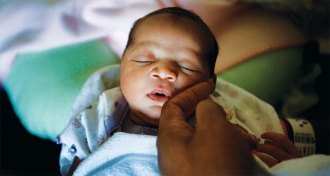Feature
-
 Genetics
GeneticsDNA evidence is rewriting domestication origin stories
DNA studies are rewriting the how-we-met stories of domestication.
-
 Anthropology
AnthropologyHow humans (maybe) domesticated themselves
Prior to taming other species, humans selected for more docile traits among fellow Homo sapiens, a slew of recent studies suggest.
-
 Quantum Physics
Quantum PhysicsQuantum computers are about to get real
Qubit-based machines are gearing up to solve problems that are out of reach for even the most powerful supercomputers.
-
 Astronomy
AstronomyLife might have a shot on planets orbiting dim red stars
The number of planets in the habitable zone of dim red suns, known as M dwarfs, is growing. They’re a good place to look for life.
-
 Health & Medicine
Health & MedicineLive antibiotics use bacteria to kill bacteria
Certain bacteria will destroy other bacteria without harming humans. They may be an answer to antibiotic-resistant infections.
-
 Health & Medicine
Health & MedicineFor babies exposed to opioids in the womb, parents may be the best medicine
A surge in opioid-exposed newborns has U.S. doctors revamping treatments and focusing on families.
By Meghan Rosen -
 Health & Medicine
Health & MedicineThe opioid epidemic spurs a search for new, safer painkillers
Today’s opioids stop pain — but they’re also dangerous. Scientists are hunting for replacements.
-
 Archaeology
ArchaeologyChaco Canyon’s ancient civilization continues to puzzle
A dynasty may have risen from the dead in an ancient Chaco great house.
By Bruce Bower -
 Genetics
GeneticsJumping genes play a big role in what makes us human
Jumping genes have been a powerful force in human evolution.
-
 Health & Medicine
Health & MedicineYes, statins protect hearts. But critics question their expanding use
Even after decades of study, questions remain about statin safety.
By Laura Beil -
 Climate
ClimateLakes worldwide feel the heat from climate change
Lakes worldwide are warming with consequences for every part of the food web, from algae, to walleye, to freshwater seals.
-
 Animals
AnimalsVenomous fish have evolved many ways to inflict pain
Fish venom shows great diversity and is being studied to treat pain, cancer and other diseases.
By Amber Dance